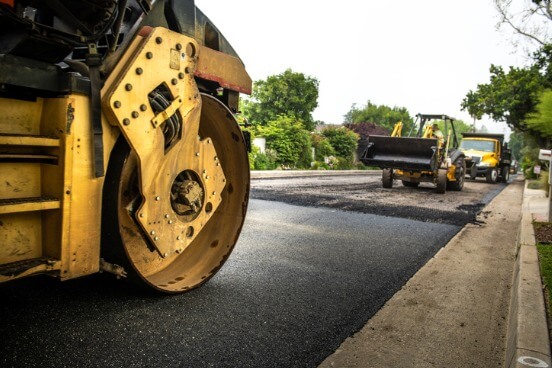Comprehending the Various Types of Asphalt Paving Available Today
In the world of construction and facilities, a comprehensive understanding of the numerous kinds of asphalt paving is important for optimal job end results. From the robust Hot Mix Asphalt, made for high-traffic locations, to the environmentally mindful Porous Asphalt that promotes water management, each type offers distinct advantages tailored to details needs. Furthermore, factors to consider such as toughness, installation rate, and sustainability even more make complex the decision-making procedure. As we discover these choices, it ends up being apparent that the option of asphalt paving can dramatically impact not just instant efficiency however additionally lasting functionality and environmental considerations.

Warm Mix Asphalt
What makes warm mix asphalt a preferred choice for road building and repair work? Hot mix asphalt (HMA) is favored for its toughness, convenience, and efficiency under differing conditions. Composed of a mixture of aggregates and liquid asphalt concrete, HMA is generated at heats, typically between 300 ° F and 350 ° F (asphalt paving acworth ga). This high-temperature application enables optimum bonding and compaction, causing a smooth, resistant surface that can hold up against hefty web traffic loads and adverse climate.
HMA's ability to be customized to certain project needs is one more significant benefit. Different ranks and formulas can be made use of to improve residential properties such as flexibility, resistance to contortion, and durability. In addition, hot mix asphalt can be quickly mounted and opened to traffic, lessening disruption throughout construction.
Environmental factors to consider likewise contribute in the preference for HMA. The product is recyclable, and reclaimed asphalt sidewalk (RAP) can be recycled, promoting sustainability in roadway building and construction methods. On the whole, hot mix asphalt attracts attention as a trusted choice, properly offering a durable, high-performance surface that satisfies the needs of modern facilities.
Cold Mix Asphalt
Cold mix asphalt is a versatile option to warm mix asphalt, especially matched for specific applications such as patching and surface area therapies. This kind of asphalt is produced at ambient temperature levels, allowing for less complicated handling and application without the requirement for extensive home heating equipment.
Commonly composed of asphalt emulsions or lowerings, cool mix asphalt can be combined on-site or acquired pre-mixed. Its buildings allow it to bind well with existing sidewalk, making it a reliable solution for repairing potholes, cracks, and other surface area defects. In addition, it can be applied in a range of weather problems, giving a practical option for year-round upkeep.

However, while chilly mix asphalt is perfect for short-lived fixes, it may not give the same durability or resilience as warm mix asphalt under hefty traffic problems. Because of this, it is finest made use of for low-traffic locations or as a temporary service up until even more irreversible repairs can be performed.
Cozy Mix Asphalt
While warm mix asphalt has actually long been the criterion for roadway building and construction, cozy mix asphalt (WMA) has actually become a cutting-edge choice that stabilizes efficiency with ecological factors to consider. WMA is generated at dramatically reduced temperature levels-- commonly in between 215 ° F and 275 ° F-- compared to hot mix asphalt, which is heated up to around 300 ° F. This reduction in temperature not only decreases power intake yet additionally reduces greenhouse gas discharges during production.
The technology behind WMA involves using ingredients or strategies that enable far better workability at reduced temperatures. These can include chemical ingredients, frothing procedures, or a combination of both. Therefore, WMA keeps the essential residential properties for longevity and efficiency while providing a more environmentally pleasant choice.

Permeable Asphalt
Permeable asphalt stands for a forward-thinking strategy in sidewalk layout, focusing on both capability and ecological sustainability. This cutting-edge product is particularly engineered to enable water to permeate through its surface, effectively reducing drainage and advertising groundwater recharge. Consequently, permeable asphalt is an exceptional option for areas vulnerable to flooding or where stormwater administration is critical.
The composition of porous asphalt varies from typical asphalt, including a higher percentage of voids that facilitate water drainage. This property not just lessens surface water accumulation but additionally assists reduce issues like hydroplaning her comment is here and boosts automobile traction during damp conditions. asphalt paving acworth ga. Additionally, permeable asphalt can add to urban warmth island decrease, as it enables for greater dissipation other and cooling impacts in urban settings
In regards to setup, permeable asphalt requires mindful consideration of underlying water drainage systems to guarantee optimum performance. Maintenance typically includes regular assessments and cleansing to avoid obstructing from debris, which can hinder its leaks in the structure. In general, permeable asphalt works as a sustainable paving remedy that aligns with contemporary ecological objectives, making it a progressively preferred choice for both exclusive and public projects.
Rubberized Asphalt
Rubberized asphalt is a sophisticated paving product that includes recycled rubber, generally sourced from scrap tires, into the asphalt mix. This cutting-edge method not only boosts the efficiency of traditional asphalt however likewise advertises ecological sustainability by reusing waste materials. The addition of rubber enhances the versatility and durability of the sidewalk, making it immune to splitting and contortion under differing temperature level conditions.
One of the significant advantages of rubberized asphalt is its capability to minimize sound pollution. The rubber particles take in noise, leading to quieter roads, which is especially valuable in city locations. This kind of asphalt gives boosted skid resistance, boosting safety and security for automobiles.
Rubberized asphalt likewise adds to prolonging the lifespan of road surface areas, bring about lowered upkeep expenses in time. This longevity is particularly beneficial for high-traffic locations where deterioration are sped up. Additionally, its resistance to moisture infiltration assists reduce the risk of water damages, better improving sturdiness.
Conclusion
In recap, the selection of asphalt paving types-- Hot Mix Asphalt, Cold Mix Asphalt, Cozy Mix Asphalt, Porous Asphalt, and Rubberized Asphalt-- each satisfy distinct features that satisfy diverse building and construction and upkeep needs. These options not just enhance roadway high quality but additionally add to sustainability via lowered energy intake and enhanced water management. Recognizing these differences is essential for picking the suitable asphalt type, ultimately making sure efficient and reliable paving remedies in different settings.
From the robust Warm Mix Asphalt, designed for high-traffic locations, to the ecologically aware Porous Asphalt that assists in water administration, each kind provides distinct advantages tailored to specific demands.Normally composed of asphalt emulsions or lessenings, cold mix asphalt can be combined on-site or purchased pre-mixed.While hot mix asphalt has actually long been the standard for road building and construction, warm mix asphalt (WMA) has arised as an innovative option that stabilizes efficiency with environmental considerations.Rubberized asphalt is an innovative paving product that incorporates recycled rubber, normally sourced from scrap tires, right into the asphalt mix.In summary, the range of asphalt paving kinds-- Warm Mix Asphalt, Cold Mix Asphalt, Cozy Mix Asphalt, Porous Asphalt, and Rubberized Asphalt-- each fulfill distinctive functions that cater to diverse building and construction and upkeep needs.